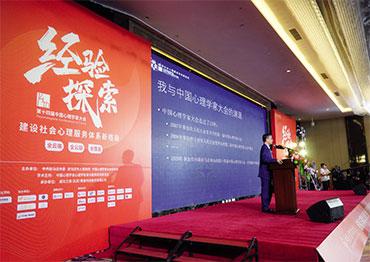First arriving in Chinese universities in the 1920s, Western psychology was largely ignored in China after 1949 when the People’s Republic of China was founded, mainly for political reasons.
Zhang Haiyin, who became a psychiatrist at Shanghai Mental Health Center in 1988 after graduating from The Second Medical School of Shanghai (now part of Shanghai Jiao Tong University), told NewsChina there was no proper training in psychotherapy in the 1980s. Those who wanted to learn had to read on their own or attend seminars.
Qiu Jianyin, director of psychology at Shanghai Mental Health Center, graduated in the 1990s from East China Normal University in Shanghai, one of the first schools with a psychology department. Qiu said that clinical psychology was rarely taught in college at the time, and most in the field relied on internships and on-the-job training.
Public awareness of counseling grew following the Wenchuan Earthquake that devastated parts of Sichuan Province in 2008, when professionals and volunteers poured into the region to treat traumatized survivors. Although more universities started psychology departments since then, there are not enough instructors to go around.
Most psychology graduates pursue careers in academic research, according to Qiao Zhihong, Party secretary of the psychology department at Beijing Normal University. He said while there are more than 100 universities and institutions offering master’s degrees in applied psychology, only half provide courses in counseling, producing under 500 counselors a year.
Adult education programs are a major pathway to certification in counseling. Off-campus training for counselors began in 1988 when German therapist and former Peking University student Margarete Haass‐Wiesegart in cooperation with Professor Wan Wenpeng of the Yunnan Province Psychiatric Hospital in Kunming brought a team of German psychotherapists to China. The team held three workshops covering major schools of psychotherapy. In 1996, Haass‐Wiesegart founded the German-Chinese Academy of Psychotherapy (GCAP). A year later, she started its psychotherapy training program that still runs today. The program, which focuses on psychoanalysis, cognitive behavior and family therapy, provided a rare opportunity for standardized training in the Chinese mainland.
The program is considered the cradle of psychotherapy in China. Qiu, a former student in the program who now heads GCAP’s China operations, said the program is directly responsible for the development of clinical psychotherapy in China. Subsequently, China started similar training programs with Norway, the US and France.
In 2001, counseling became a formally recognized career in China, and the Ministry of Human Resources and Social Security held counseling certification exams from 2002 to 2017. During this period, numerous training programs emerged and about 1.5 million people were accredited. However, the quality of training varied, and the certificate, though still officially valid, is not universally recognized by professional psychology organizations.
As mental health treatment entered the public consciousness, demand for therapy grew. Over 100 million people aged 15 and older (about 10 percent of the overall population) suffer from mental disorders, while 16 million are diagnosed with severe mental disorders, according to the People’s Daily, citing an epidemiological survey on mental disorders in many regions in 2016. According to the Chinese Association for Mental Health (CAMH), there were less than 30,000 professionally trained counselors in China in 2018, a far cry from the World Health Organization’s recommended ratio of one counselor per 1,000 people.

 Old Version
Old Version

